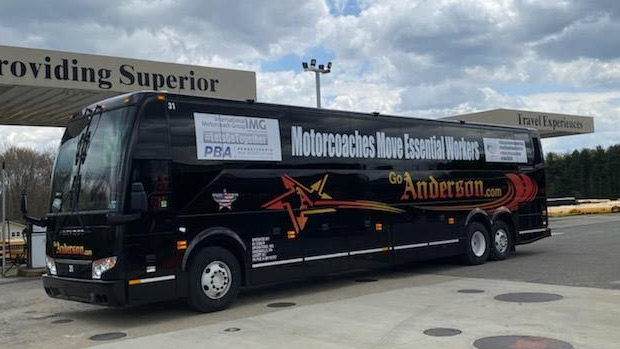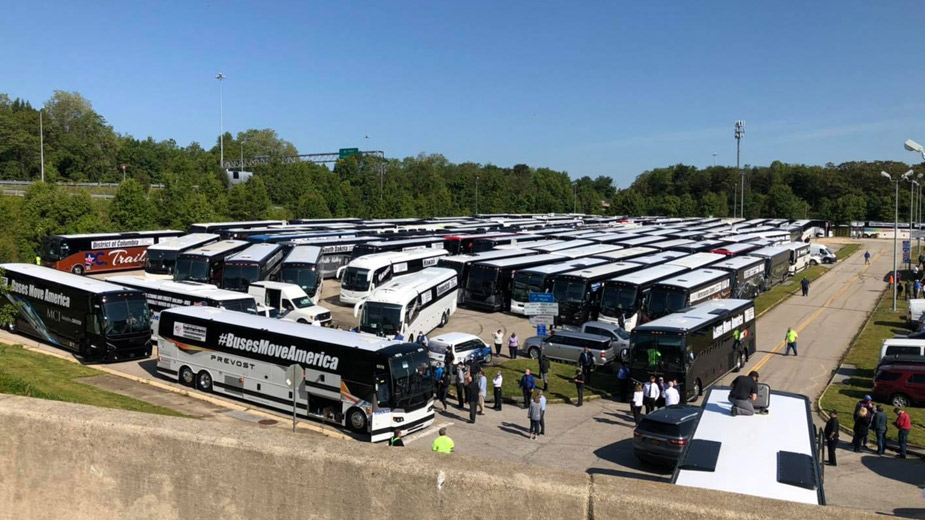Virus Took $6M Toll on Anderson Coach – and that’s Just the Start
WASHINGTON, D.C. – Almost overnight, Anderson Coach and Travel lost $6 million in business.
And that’s just counting what was already on the books when travel slowed – in some cases stopped altogether – because of the coronavirus, says Doug Anderson, president of the motor coach company based in Greenville, Pa.
On March 13, when Gov. Tom Wolf issued his shut-down order for the vast majority of Pennsylvania, busing companies in the commonwealth lost virtually all of their business “in the blink of an eye and the stroke of a pen,” Anderson says. The measures are necessary, he says, but in a time when Anderson Coach would normally be booking clients for June, July and August, the phones sit silent.
“What we’re all faced with is basically zero revenue during what should be our busiest season and what sustains us for the balance of the year,” he says. “It all dried up and evaporated. We’re all at a loss as to when we can see any light at the end of this tunnel. It looks like a long, dark tunnel with not much opportunity to get people back on a motorcoach until we see some major changes in how we’re able to deal with this pandemic.”
The soonest there is a possibility for a return to normalcy is in the third quarter, when schools are normally back in session, bringing with them home-to-school busing, athletic transportation and field trips. But, Anderson says, all of that hinges on a two-letter word: if.
“There’s concern that schools might not reconvene in the fall. If that’s true, I have 177 school buses sitting idle with no revenue coming through the door,” he says. “That’d be 277 people who would be out of a job and permanently into the unemployment lines.”
Anderson Coach was among the 400-plus motorcoach companies from all 50 states that brought some 600 buses to Washington Wednesday for a rally to urge Congress to include $15 billion relief for the industry in the next $3 trillion coronavirus response bill, which House Democrats hope to vote on Friday.
“We’re not asking for a new handout. We’re asking Congress to fix the error. When they were handing out money for transportation, they left us out. We’re asking them to fix that,” says Melanie Hinton, director of communications for the American Bus Association, which co-organized the rally with the United Motorcoach Association.
In previous relief bills, Congress allocated some $75 billion to other transportation industries, including $25 billion to airlines and $1 billion for train service Amtrak.
Currently, Hinton said, the industry has 36,000 buses sitting idle and 90% of it’s 100,000-member workforce has been laid off or furloughed.
“Our economist said within the first five months of this shutdown, we’re losing $8 billion,” she says. “Spring and summer is when this industry makes between 60% and 75% of their income, especially on the tourism side with field trips, spring break and families traveling.”

While motorcoach companies were eligible for Paycheck Protection Program – Anderson Coach received money through the program, Anderson says – and Economic Injury Disaster Loans through the Small Business Administration, those programs don’t fit the needs of bus companies.
“We’re a very capital-intensive business, much like airlines. … You can’t use [the PPP or EIDL loan] to pay bank notes. You can’t use it to pay overhead,” Anderson said. “They don’t cover the right things. We had eight weeks of opportunity to bring our employees back and sustain their employment [with the PPP loan]. The trouble is we’re six weeks in and it’ll be another probably 12 weeks before I have a motor coach on the road again to generate any sort of revenue, let alone 40 ready to roll every weekend like we would traditionally.”
A new bus costs around $600,000 and it’s common for companies to buy a few new ones every year, Anderson says. Then, there are the costs that come with a fleet, Hinton adds.
“They still have to pay for insurance on the buses, their leases. Those don’t stop just because people stop traveling. That’s what they need help with,” she says.
Right now, there’s also costs in making sure the buses are safe for travel.
“There’s major costs for enhancements to make an environment that the traveling public will feel comfortable in when they get in any sort of public transportation. There’s major expenditures in air cleaning or regular spraying with antiviral sprays,” he says. “We’re trying to equip our buses for that now under the pretense that maybe in the fourth quarter or possibly the third when colleges go back and there will be athletics.”
In Anderson’s eyes, the relief solution could be a long-term, low-interest loan; the Paycheck Protection Program loan is 1% for two years if it’s not forgiven at the end of the eight-week period for retaining all employees.
There seems to be some support for allocating the money, Anderson and Hinton say. Anderson has talked to his congressional representatives, including U.S. Rep. Mike Kelly, and says they’ve backed the carve out. Hinton, meanwhile, says U.S. Reps. Peter DeFazio, D-4 Oreg., and Richard Neal, D-1 Mass., have sent a letter to Treasury Secretary Steve Mnuchin urging the funds be allocated.
Talking to other business owners at the drive through Washington, which passed the White House and Capitol Hill, and previously with industry representatives, Anderson says he’s heard predictions that as many as 40% of the country’s busing companies could go under without relief to get them through the COVID-19 pandemic. In total, that would be more than 1,400 companies.
“If that comes true and we really do lose 40% of these companies, the industry is going to be in dire straights and overall tourism is going to be in dire straights as well,” he says.
The ripple effect from motorcoaches is a large one. A bus filled with students for a field trip to New York, for example, would stay at a hotel, eat at restaurants for most of their meals, visit museums and tourist destinations and, sometimes, make stops along the way.
“They eat and get entertained at all these locations. It’s quite the web that we’re essential to,” he says. “There were some people supporting us today from the hospitality business. They were on the curb in front of the White House and Capitol with signs saying their business wouldn’t survive without the bus business.”
According to economists at the American Bus Association, 2 million people would be affected if there were no motorcoach tourism and $237 billion in economic impact would be gone. Nationally, buses move 600 million people annually, a figure not far off from the domestic airline industry’s 700 million.
But that’s not all motorcoach companies do, Hinton says, although tourism is what’s most often associated with the sector.
“We take people to work. We connect rural areas to inner cities. We evacuate people in natural disasters. We move troops when they go base to base or arrive from or leave for deployment,” she says.
During the coronavirus outbreak, companies in the Midwest took buses full of health-care workers to New York City as the city faced a dire shortage.
All told, the change in fortunes for Anderson Coach and Travel – and the rest of motorcoach industry – is likely to have caused whiplash. Anderson says the spring and summer seasons were ramping up to be the company’s best in its 82-year history. Now, have come a set of challenges it’s never faced before that put its future into real jeopardy.
“With the shutdown comes some real hard economic conditions that are unique to our industry. We can’t do carryout food. If we could convince people to get on a bus, that’s another challenge when we don’t have the ability to social distance,” he says. “We don’t know when there could be a vaccine. It could be next spring. We could be looking at 18 months with 10% or 20% of the revenue we’d need to survive.”
Pictured: More than 400 motorcoach companies from all 50 states arrived in Washington, D.C., on Wednesday for a rally to urge relief for the industry that’s taken a massive hit as travel of all kinds has ground to a halt. Image via the American Bus Association.
Copyright 2024 The Business Journal, Youngstown, Ohio.



